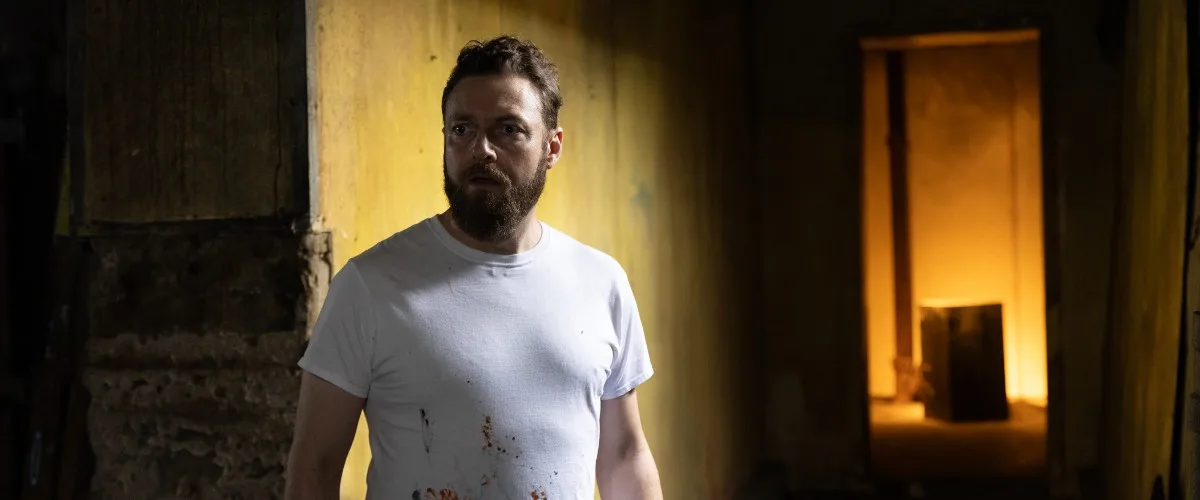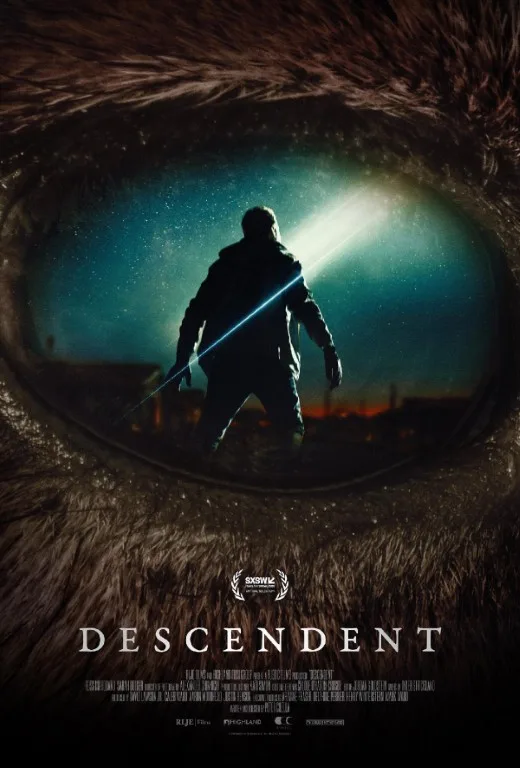“What to Expect When You’re Expecting” is a classic preparation book for pregnancy and birth, but it regrettably does not include advice on how to deal with the dad seeing a UFO while repairing a defective light on his house, falling to the street, suffering a head injury, and waking up convinced that he’s been abducted and experimented on by aliens. For that scenario, you’ll need to watch writer-director Peter Cilella’s “Descendent.”
Set in contemporary Los Angeles, “Descendent” focuses on an expectant couple, Sean (Ross Marquand of “The Walking Dead”) and Andrea (Sarah Bolger, of “The Tudors” and “Into the Badlands”). From all indications, theirs is a functioning marriage of smart, decent people. When the story begins, Andrea has been put on “bed rest” by her doctor due to concerns about eclampsia. Andrea is anxious about the impending birth, just as any mother who fears complications would be. Sean, a security guard at an elementary school, is anxious, too. But even at the very start of the movie, before the main story has kicked in, there seems to be an undercurrent of something more fearful and dark in Sean. We learn that there are biographical reasons for this, chiefly his own father’s death by suicide.
One night, Sean goes outside with a ladder to try to fix a defective light on their roof. While standing in the alley, he sees a speck in the sky that zips about like no known aircraft, drones included. On the roof, he’s blasted by white light, falls into the alley, and suffers an accident that lands him in the hospital and sends him home with a bandage wrapped around his noggin. And that’s when things get really unsettling.
As the rest of the story unreels, the filmmakers dole out horrifying snippets showing us what Sean sees, hallucinates, and dreams about. Sean begins to draw these images, manifesting an artistic talent not seen before. There are images from his childhood as well as from the spaceship, other images he doesn’t understand, and some that he hides from Andrea because they’re about the pregnancy. Without giving too much away, let’s say that Sean’s predicament is classic abduction narrative, with creepy and nasty variants of imagery that tend to appear in such tales. The big question, though, is: did any of that stuff actually happen to Sean, or have generalized and specific fears about becoming a father metastasized in his imagination because of the accident?
Among its other virtues, “Descendent” is a great example of how a low-budget film can do more with less. We don’t get too many looks at the alleged extraterrestrials in their actual form, just flash cuts mixed with images of Sean on the starship. He’s wrapped in a net made of sticky green material, reminiscent of the mesh that encloses supermarket hams. There are also images which imply that various loved ones expressing concern about Sean’s mental health and chastising him for bringing chaos to Andrea’s pregnancy are really flesh-wrapped aliens impersonating humans. Their bulging, fishlike eyes pop from plausibly human eye sockets. The spacecraft is represented by very bright lights blazing onto Sean, and into our eyes, and by a speck in the night sky over Los Angeles.
Film history buffs will naturally think about “Rosemary’s Baby,” the Roman Polanski thriller in which Mia Farrow plays a young expectant mother who’s convinced that she’s not carrying her husband’s baby, but the devil’s. As in Cilella’s film, the intimations of unholy obscenity are conveyed with flash-cuts and dream imagery (up until the point where we get the full story, which is something that never happens in “Descendent”). This movie could be titled “Sean’s Baby.” On top of the specific character concerns, it’s about the terror that grips some expectant fathers about their suitability for the job, whether or not they’ve got some awful family trauma in their past.
Cillella is quite adept with the “X-Files” type imagery and dispenses conspiratorial information when it’s most needed, but ultimately, that sort of material isn’t visually or narratively fresh, just variations on things you’ve seen before. What does feel new is the attention that the movie plays to the dynamics of a marriage in which the husband is the more troubled of the two partners, so much so that he craters just when his support is needed most, and lets the universal anxiety about not being up to the task of fatherhood turn into a self-fulfilling prophecy that makes his home life a shambles. Cilella writes superb married-couple dialogue, and Marquand and Bolger play all their scenes together so convincingly, and with such agonizing vulnerability, that there might be points where you wish that you were watching a kitchen sink drama starring the two of them.
Marquand makes a marvelous everyman hero who has let his culture’s toxic conditioning push him towards cliched signifiers of masculinity, like claiming that he’s gotten a gun for “protection” when it’s really about countering his fear of inadequacy. (Protection against what? Another abduction? Or the alien baby that he fears Andrea is carrying?) Marquand has big, expressive eyes and conveys barely hidden but overwhelming pain vividly, with no actorly fuss whatsoever. He doesn’t usually get roles like this. It would be great to see him play more of them.
This is far from a perfect movie. The filmmaker goes to the “This is really happening/no, hold on, it’s a dream or hallucination!” well too many times. The fixation on Sean’s plight is understandable because that’s what the movie has chosen to focus on, but you might want more of Andrea’s reactions to it. The finale is ambiguous in a 1970s head-scratching drama sort of way, but I don’t think it’s entirely earned; to these eyes, it plays more like the movie throwing up its hands and saying, “This seems like a good place to end,” as opposed to something that becomes a prompt for post-screening discussions or arguments. But the sheer craft brought to bear on every scene is undeniable, and the lead performances are so powerful that they go above and beyond almost anything being done in movies in this vein.
What genre does this movie belong to? It’s definitely horror, but it’s hard to say if it’s science fiction or merely science fiction adjacent, considering that it deliberately avoids landing on a reliable explanation for what’s happening to Sean. It’s certainly a portrait of matrimony and pregnancy, though one that should never, ever be screened in a Lamaze class.




















